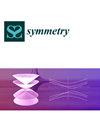基于改进大猩猩部队优化器的模糊PD-(1+PI)控制器在对称和网络攻击下的智能电网频率调节
IF 2.2
3区 综合性期刊
Q2 MULTIDISCIPLINARY SCIENCES
引用次数: 0
摘要
在负荷不确定且太阳能和风能并网的智能电网系统中,需要一种有效的频率控制策略来实现发电和负荷平衡。网络攻击是新兴威胁,SG系统是典型的网络攻击目标。本文提出了一种改进的基于大猩猩部队优化器(iGTO)的模糊PD-(1+PI) (FPD-(1+PI))结构用于SG系统的频率控制。SG包含柴油发动机发电机(DEG),可再生能源,如风力发电机(wtg),太阳能光伏(PV),以及与电动汽车(ev)结合的飞轮储能系统(FESSs)和电池储能系统(BESSs)等存储元件。首先,通过考虑基准测试函数,证明了投影iGTO优于大猩猩部队优化器(GTO)和一些最近提出的优化算法。在接下来的步骤中,使用传统的PID控制器,并将GTO方法与GTO、粒子群优化(PSO)和遗传算法(GA)方法的有效性进行比较。在接下来的阶段,在各种对称操作条件下以及导致拒绝服务(DoS)和信号传输延迟的不同网络攻击下,证明了所提出的FPD-(1+PI)结构相对于模糊PID (FPID)和PID结构的优越性。本文章由计算机程序翻译,如有差异,请以英文原文为准。
Improved Gorilla Troops Optimizer-Based Fuzzy PD-(1+PI) Controller for Frequency Regulation of Smart Grid under Symmetry and Cyber Attacks
In a smart grid (SG) system with load uncertainties and the integration of variable solar and wind energies, an effective frequency control strategy is necessary for generation and load balancing. Cyberattacks are emerging threats, and SG systems are typical cyber-attack targets. This work suggests an improved gorilla troops optimizer (iGTO)-based fuzzy PD-(1+PI) (FPD-(1+PI)) structure for the frequency control of an SG system. The SG contains a diesel engine generator (DEG), renewable sources like wind turbine generators(WTGs), solar photovoltaic (PV), and storage elements such as flywheel energy storage systems (FESSs) and battery energy storage systems (BESSs) in conjunction with electric vehicles (EVs). Initially, the dominance of the projected iGTO over the gorilla troops optimizer (GTO) and some recently suggested optimization algorithms are demonstrated by considering benchmark test functions. In the next step, a traditional PID controller is used, and the efficacy of the GTO method is compared with that of the GTO, particle swarm optimization (PSO), and genetic algorithm (GA) methods. In the next stage, the superiority of the proposed FPD-(1+PI) structure over fuzzy PID (FPID) and PID structures is demonstrated under various symmetry operating conditions as well as under different cyberattacks, leading to a denial of service (DoS) and delay in signal transmission.
求助全文
通过发布文献求助,成功后即可免费获取论文全文。
去求助
来源期刊

Symmetry-Basel
MULTIDISCIPLINARY SCIENCES-
CiteScore
5.40
自引率
11.10%
发文量
2276
审稿时长
14.88 days
期刊介绍:
Symmetry (ISSN 2073-8994), an international and interdisciplinary scientific journal, publishes reviews, regular research papers and short notes. Our aim is to encourage scientists to publish their experimental and theoretical research in as much detail as possible. There is no restriction on the length of the papers. Full experimental and/or methodical details must be provided, so that results can be reproduced.
 求助内容:
求助内容: 应助结果提醒方式:
应助结果提醒方式:


